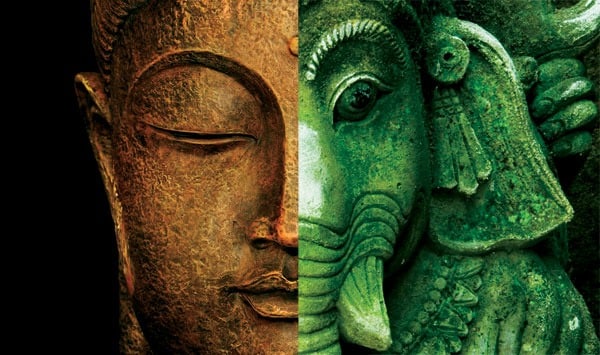Comparing two religions in their similarities, differences, and the in-between
“Can you do a simple comparison of Hindu versus Buddhism at some time in the future?” -Inga D
This article comes from a request from my good friend Inga, thanks for the great idea!
Most of my experience with these two religions is based upon my knowledge of their holy texts and the philosophy I have gained through school and yoga. I am extremely excited to experience these religions more fully in about 3 weeks when I leave for India. Kathmandu is supposedly a fusion of Hindu and Buddhist traditions and I will be there from April 3rd to the 17th.
Hinduism and Buddhism seem to come from a shared ancestry, both place an enormous amount of emphasis on non-violence amongst other core tenets. Both are more lifestyle oriented ways of life rather than simply belief systems and have origins in Ganges culture of northern India during about 500 BCE.
Buddhism supposedly focuses on the teachings of a single teacher while Hinduism’s teachings are from scattered sources, but there are many influences that are shared, or responded to in the Buddhist religion. For instance, the Upanishads seemed to be responded to by many Buddhist tenets and in fact, most Hindus consider Buddhism to be an offshoot of their religion, considering the Buddha to be an avatar of Vishnu.
Even the meditational 7th and 8th limbs of yoga, Dharana and Samadhi and shared as meditation foundations in Buddhism. Both religions believe that life is full of suffering based on your prior karma and that it is your purpose to follow Dharma, or your righteous path which leads to enlightenment, or freedom from suffering. Both religions reject the idea of angels (protective spirits), or prophets, tend to be extremely open to female ascetics (more so in Buddhism), and both are open to atheists. Click for more information on Hinduism or Buddhism.
Now onto major differences in the religions, we’ll start with what could be the basis of all religions: god and creation. Hinduism believes that god is in everything, that all beings are a part of the Brahman, or eternal energy source of the universe. Therefore, there are a handful of primary deities and many accessory deities in the Hindu pantheon of gods. Buddhism, on the other hand, believes that there is no creator god and that at the core of the human, there is nothing. They explicitly reject a creator god and do not pay heed to any delusions of god that other religions may have, though they respect the beliefs of other religions. Jainism, which has many shared roots with both religions, teaches a sustaining god at the source of the universe who has always been and always will be. This seems to the biggest difference in religions.
The second, and arguably most important difference in the two religions are the tenets of enlightenment. Hindus believe enlightenment is liberation from Samsara to be one with god while Buddhists believe that Nirvana is truly realization of the nothing within, giving freedom from suffering by realizing the freedom of nothingness.
The third major difference is within the meditation practices of each religion, most likely because of the different ways liberation is obtained. Buddhists practice meditation with liberating cognition, or thought patterns, while Hindus practice to slow the mind and to cease thought. Because god is at the source of nothing, focusing on nothing is focusing on god, opposed to Buddhism in which focusing on nothing would not be liberating. The Buddha was the one to express a constant mindfulness, rather than one that would be turned on to practice yoga and meditation, then off during the rest of the day which was a big leap from the philosophy of the Upanishads.
Both religions believe in miscellaneous deities, though Hinduism is the only one to accept them as more than illusion. Hinduism can even have personal gods, as well as personal pantheons of gods. Many Hindu believers belief in thousands, if not millions of different gods, depending on their tradition. Neither puts an intense focus on these devas, or illusory gods, but both are reverent towards the beliefs of the individual.
Hinduism tends to be stricter in practice, at least from the original tenets of Buddhism. Hindus will be extremely mindful while during their rituals, exacting, meticulous, and during yoga you can see that there is a flexion of focus and mindfulness. Buddhists take this concept and apply it constantly, always striving for greater mindfulness, even during things like defecation and chores. Buddhists use the mind as a tool for exploration, while Hindus generally think of the mind as a hinderance from enjoying the pleasures of god.
The most impactful religious knowledge is made more powerful in conjunction with knowledge from different religious traditions and with global perspective on humanity. In other words, combining multiple religions to take the best aspects of each can lead to the most powerful realizations about our shared existence as humans and can help us to unveil our nature and hopefully, to find freedom from the sufferings of this world, in one way or another.


Dear Sir, good article. I’d like to ask your permission to use your image of Buddha vs. Ganesh in a book I am writing.
Well it’s not mine, so I can’t give you permission.